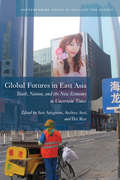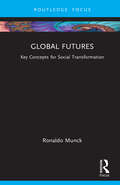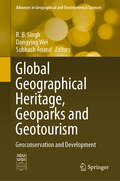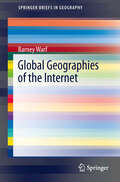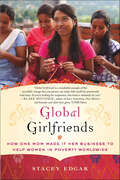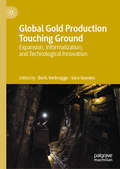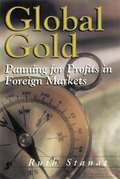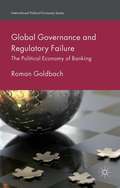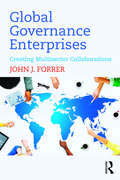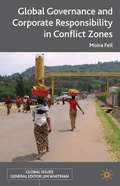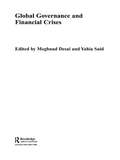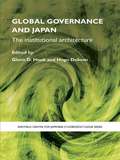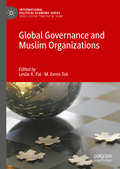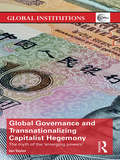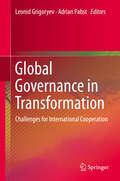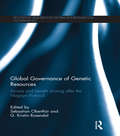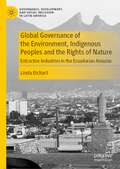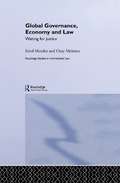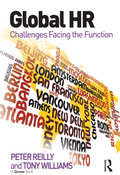- Table View
- List View
Global Futures in East Asia: Youth, Nation, and the New Economy in Uncertain Times
by Ann Anagnost Andrea Arai Hai RenThe East Asian economic miracle of the twentieth century is now a fond memory. What does it mean to be living in post-miracle times? For the youth of China, Taiwan, Japan, and South Korea, the opportunities and challenges of the neoliberal age, deeply shaped by global forces in labor markets, powerfully frame their life prospects in ways that are barely recognizable to their parents. Global Futures in East Asiagathers together ethnographic explorations of what its contributors call projects of "life-making. " Here we see youth striving to understand themselves, their place in society, and their career opportunities in the nation, region, and world. While some express optimism, it is clear that many others dread their prospects in the competitive global system in which the failure to thrive is isolating, humiliating, and possibly even fatal. Deeply engaged with some of the most significant theoretical debates in the social sciences in recent years, and rich with rare cross-national comparisons, this collection will be of great interest to all scholars and students interested in the formation of subjects and subjectivities under globalization and neoliberalism.
Global Futures: Key Concepts for Social Transformation (Routledge Critical Development Studies)
by Ronaldo MunckGlobal Futures: Key Concepts for Social Transformation provokes us to rethink some of the key words and concepts which define the current global order. Prompted by crises around the world, it seeks to re-energise our desire for a better future.The book takes seven key concepts from the new global studies and considers how they are used and whether they are adequate for addressing the twenty-first century's increasingly complex global order. The topics covered include widely used concepts such as development, modernity, history, and politics, as well as more unusual themes such as desire, complexity, and alternative futures. The core message of this book is that we need to grasp the complex and contradictory reality behind these important concepts in order to foster a new way of thinking, seeing, and acting for a future fit for human purpose.Written by Ronaldo Munck, a key social theorist and social activist with a Latin American and European background, this book will be perfect for students and researchers of sociology, politics, international relations, and global development.
Global Geographical Heritage, Geoparks and Geotourism: Geoconservation and Development (Advances in Geographical and Environmental Sciences)
by R. B. Singh Subhash Anand Dongying WeiThis book explores the geographical, geomorphological, ecological, touristic and socioeconomic aspects of natural heritage, argues for the dynamic conservation of that heritage and explains its key characteristics, promotion, conservation and management to achieve sustainable development goals. Emerging concepts such as geodiversity, geographical heritage sites, geomonuments, geoparks and geotourism are increasingly being used by conservationists. At present, the development of geoparks is a major global theme involving the application of geosciences to promote the inclusive growth of society and the protection and conservation of our unique geoheritage. Currently, there are 147 UNESCO global geoparks across 41 countries, in addition to a number of national-level geoparks. Pursuing a holistic approach towards such sites will sensitise the general public to the need for geoconservation of significant geosites and promote it through geotourism. It is a crucial issue, as various countries around the world are eager to develop their geoparks and are working for the conservation of geoheritage sites at the national level. This unique book gathers contributions from 15 countries in the form of case studies analysing the realities on of geographical heritage, geoparks and geotourism. The respective chapters address the role of geoparks as essential tools for education, recreation and nature conservation. Given its scope, the book offers a valuable guide for geoscientists, planners, policymakers, civil society and anyone concerned about the conservation of geoheritage sites and geoparks for a sustainable future Earth.
Global Geographies of the Internet
by Barney WarfToday, roughly 2 billion people use the internet, and its applications have flourished in number and importance. This volume will examine the growth and geography of the internet from a political economy perspective. Its central motivation is to illustrate that cyberspace does not exist in some aspatial void, but is deeply rooted in national and local political and cultural contexts. Toward that end, it will invoke a few major theorists of cyberspace, but apply their perspectives in terms that are accessible to readers with no familiarity with them. Beyond summaries of the infrastructure that makes the internet possible and global distributions of users, it delves into issues such as the digital divide to emphasize the inequalities that accompany the growth of cyberspace. It also addresses internet censorship, e-commerce, and e-government, issues that have received remarkably little scholarly attention, particularly from a spatial perspective. Throughout, it demonstrates that in cyberspace, place matters, so that no comprehensive understanding of the internet can be achieved without considering how it is embedded within, and in turn changes, local institutional and political contexts. Thus the book rebuts simplistic "death of distance" views or those that assert there is, or can be, a "one-size-fits-all, cookie-cutter" model of the internet applicable to all times and places.
Global Girlfriends: How One Mom Made It Her Business to Help Women in Poverty Worldwide
by Stacey EdgarStart small, dream big, change lives— how one woman harnessed the power of fair trade to help women in poverty help themselves Seven years ago, Stacey Edgar had a $2,000 tax return and a deep desire to help provide economic security for women in need. She knew that of the 1.3 billion people living on less than $1 per day, seventy percent are women. What she didn't have was a business plan. Or a passport. But that didn't stop her from creating a socially conscious business that has helped poor women in five continents feed their families and send their children to school. Global Girlfriend has since grown into a multi-million dollar enterprise that specializes in handmade, fairly traded, ecoconscious apparel, accessories, and items made by women all over the world. Global Girlfriends is Stacey's inspiring story of following her convictions, as well as her passionate argument for simple actions we can all take to eliminate extreme poverty. Stacey Edgar refused to be paralyzed by the size of world poverty; she started by taking several small steps, personal responsibility firmly in hand, and never looked back.
Global Gold Production Touching Ground: Expansion, Informalization, and Technological Innovation
by Sara Geenen Boris VerbruggeIn recent decades, gold mining has moved into increasingly remote corners of the globe. Aside from the expansion of industrial gold mining, many countries have simultaneously witnessed an expansion of labor-intensive and predominantly informal artisanal and small-scale gold mining. Both trends are usually studied in isolation, which contributes to a dominant image of a dual gold mining economy. Counteracting this dominant view, this volume adopts a global perspective, and demonstrates that both industrial gold mining and artisanal and small-scale gold mining are functionally integrated into a global gold production system. It couples an analysis of structural trends in global gold production (expansion, informalization, and technological innovation) to twelve country case studies that detail how global gold production becomes embedded in institutional and ecological structures.
Global Gold: Panning for Profits in Foreign Markets
by Ruth StanatWritten for executives in mid-sized or smaller companies, the book provides advice on determining which countries offer the biggest opportunities for different types of companies, how to form strategic partnerships, protecting intellectual property, and using the Internet to expand businesses abroad. Includes an international resource directory divided by region and country.
Global Goods and the Spanish Empire, 1492–1824
by Bartolomé Yun-Casalilla Bethany AramDrawing upon economic history, cultural studies, intellectual history and the history of science and medicine, this collection of case studies examines the transatlantic transfer and transformation of goods and ideas, with particular emphasis on their reception in Europe.
Global Governance And Regulatory Failure
by Roman GoldbachDoes global governance contribute to regulatory failure and financial crises? And, if it does, should we enhance global cooperation to prevent future crises or confine our focus on the national level? Roman Goldbach reveals that, while global cooperation of bank regulators should minimise the emergence of financial crises, it actually contributes to the build-up of financial bubbles and the resulting turmoil. Underlying this regulatory failure is the transnational regulatory regime that globalises the governance structure and policy process of regulating banks. It entrenches asymmetric influence in a manner that raises the possibilities of national and transnational firms integrating their preferences into global regulatory standards, while at the same time decreasing the incentives for, and capacities of, politicians and regulators to protect the public good of systemic stability. Moreover, Goldbach argues that the underlying governance structure remains intact to date, which promises comparable future regulatory failure. The book provides both a theoretical framework of the global political economy of banking regulation and a detailed analysis of the policies and politics of the Basel Committee on Banking Supervision and its two most recent global standards- the Basel II and Basel III frameworks. Goldbach's innovative analysis, which integrates all actors and institutions of the global political economy and builds on new empirical material from national, transnational, and international processes, demonstrates how global governance has contributed to the onset of the "Great Recession" and how it continues to increase the likelihood of future global financial crises.
Global Governance Enterprises: Creating Multisector Collaborations
by John J. ForrerGlobal Governance Enterprises focuses on a specific multi-sector collaboration—the formation of an entity that carries out global governance—providing a detailed analysis of the context of their emergence, as well as how they are created, managed, and sustained. Forrer considers the growing challenges to successful global governance and the role of multi-sector collaborations in overcoming these challenges, arguing that such partnerships should be considered successful only when they meet specific conditions that ensure they are “doing well” and “doing good.” By establishing a coherent framework to define global governance enterprises across a wide span of sectors, the book develops a strong theoretical foundation for this type of partnership and provides the reader with an understanding of the practical, operational realities of organizing, financing, and sustaining global governance enterprises. It includes a full section of case studies, ranging from healthcare to environmental organizations, providing practical insight into this form of governance and its function. This book should be on the shelf of any professional or student interested in global governance, public–private partnerships, or public management.
Global Governance and Corporate Responsibility in Conflict Zones
by Moira FeilCorporations in conflict zones and their provision of security are particularly relevant for understanding whether private actors are increasingly sources of governance contributions that regulate public goods. Feil highlights the discrepancies between political and theoretical expectations of corporate engagement and governance contributions.
Global Governance and Financial Crises (Routledge Studies In The Modern World Economy)
by Meghnad Desai Yahia SaidThe editors of this book have pulled together a collection of chapters that review the spate of financial crises that have occurred in recent years starting with Mexico in 1994 and moving on to more recent crises in Turkey and Argentina. With impressive contributors such as Douglas Gale, Gabriel Palma and Andrew Gamble, the book is a timely and aut
Global Governance and Japan: The Institutional Architecture (The University of Sheffield/Routledge Japanese Studies Series)
by Glenn D. Hook Hugo DobsonLeading specialists from Europe and Japan examine the institutional mechanisms of governance at the global level and provide concrete evidence of the role Japan plays in these institutions. An excellent introduction to the concept of global governance, the volume analyzes how global governance actually works through the global institutional mechanisms of governance. It provides an up-to-date and contemporary analysis of the six most important global institutions, namely: the Group of 7/8 the Organisation for Economic Cooperation and Development the World Bank the International Monetary Fund the World Trade Organization the United Nations. Written clearly and concisely, the book provides a thorough and accessible discussion on Japan’s role within these institutions and uses supporting case studies to ask whether Japan is reactively or proactively involved in trying to shape these institutions in order to promote its own interests. As such, it will be a valuable resource for undergraduates and scholars with an interest in global governance, Japanese politics and political economy.
Global Governance and Muslim Organizations (International Political Economy Series)
by M. Evren Tok Leslie A. PalThere are 1.6 billion Muslims in the world, represented on the world stage by 57 states, as well as a host of international organizations and associations. This book critically examines the engagement of these states in systems of global governance and with a variety of policy regimes, including climate change, energy, migration, humanitarian aid, international financial institutions, research and education. Chapters explore the dynamics of this engagement, the contributions to global order, the interests pursued and some of the contradictions and tensions within the Islamic world, and between that world and the ‘West’. An in-depth perspective is provided about the traditional and new forms of multilateralism and the policy spaces formed which provide new opportunities for the Muslim and non-Muslim world alike.
Global Governance and Transnationalizing Capitalist Hegemony: The Myth of the 'Emerging Powers' (Global Institutions)
by Ian TaylorThis book is a critique of claims regarding how emerging economies are supposedly rewriting the rules of global governance and ushering in alternative models to neoliberal orthodoxy. It argues that such assumptions are abstractions that ignore both the transnationalizing nature of the global political economy and the actual policy goals of the ruling classes within most emerging economies. Considering the larger issues behind the emerging economies (or powers) debate, the book deploys an adapted global capitalism perspective with insights from Gramsci, Poulantzas and Cox, to argue that the transnational nature of the global political economy and the actual policy goals of the dominant elites within most emerging economies merge to undermine any transformative element. Far from challenging the global order, these ostensible new rivals in fact seek to integrate their economies more and more within the existing liberal global economy. Inter-state dynamics and even inter-elite tensions exist and it is clear that the nation state has not simply become a transmission belt for global capital, but equally we must move beyond the surface phenomena that are most visible in global tensions to get at the underlying essence of social and class forces in the global political economy. Looking at the largest emerging powers, such as Brazil, Russia, India and China, Taylor explains why the emerging powers’ elites, although essentially subscribing to neoliberalism (in all its variegated forms) may confront the core in a myriad of ways, but that these are not challenges to the ongoing world order and, in fact, the so-called emerging powers serve a legitimizing function for the extant global system. The book will be of great use to graduates and scholars of International Relations, Global/International Political Economy and International Development.
Global Governance in Transformation: Challenges for International Cooperation
by Adrian Pabst Leonid GrigoryevThis book analyzes the state of global governance in the current geopolitical environment. It evaluates the main challenges and discusses potential opportunities for compromise in international cooperation. The book’s analysis is based on the universal criteria of global political stability and the UN framework of sustainable development. By examining various global problems, including global economic inequality, legal and political aspects of access to resources, international trade, and climate change, as well as the attendant global economic and political confrontations between key global actors, the book identifies a growing crisis and the pressing need to transform the current system of global governance. In turn, it discusses various instruments, measures and international regulation mechanisms that can foster international cooperation in order to overcome global problems. Addressing a broad range of topics, e.g. the international environmental regime, global financial problems, issues in connection with the energy transition, and the role of BRICS countries in global governance, the book will appeal to scholars in international relations, economics and law, as well as policy-makers in government offices and international organizations.
Global Governance of Genetic Resources: Access and Benefit Sharing after the Nagoya Protocol (Routledge Research in Global Environmental Governance)
by Sebastian Oberthür G. Kristin RosendalThis book analyses the status and prospects of the global governance of Access Benefit Sharing (ABS) in the aftermath of 2010’s Nagoya Protocol to the Convention on Biological Diversity (CBD). The CBD’s initial 1992 framework of global ABS governance established the objective of sharing the benefits arising from the use of genetic resources fairly between countries and communities. Since then, ABS has been a contested issue in international politics – not least due to the failure of effective implementation of the original CBD framework. The Nagoya Protocol therefore aims to improve and enhance this framework. Compared to the slow rate of progress on climate change, it has been considered a major achievement of global environmental governance, but it has also been coined a ‘masterpiece of ambiguity’. This book analyses the role of a variety of actors in the emergence of the Nagoya Protocol and provides an up-to-date assessment of the core features of the architecture of global ABS governance. This book offers a central resource regarding ABS governance for those working on and interested in global environmental governance. This is achieved by focusing on two broad themes of the wider research agenda on global environmental governance, namely architecture and agency. Furthermore, individual chapter contributions relate and link ABS governance to other prominent debates in the field, such as institutional complexes, compliance, market-based approaches, EU leadership, the role of small states, the role of non-state actors and more. Partly due to its seeming technical complexity, ABS governance has so far not been at the centre of attention of scholars and practitioners of global environmental governance. In this book, care is taken to provide an accessible account of key functional features of the governance system which enables non-specialists to gain a grasp on the main issues involved, allowing the issue of ABS governance to move centre-stage and be more fully recognised in discussions on global environmental governance.
Global Governance of the Environment, Indigenous Peoples and the Rights of Nature: Extractive Industries in the Ecuadorian Amazon (Governance, Development, and Social Inclusion in Latin America)
by Linda EtchartThis book explores the obstacles facing indigenous communities, non-governmental organizations, governments, and international institutions in their attempts to protect the cultures of indigenous peoples and the world’s remaining rainforests.Indigenous peoples are essential as guardians of the world’s wild places for the maintenance of ecosystems and the prevention of climate change. The Amazonian/Andean indigenous philosophies of sumac kawsay/suma qamaña (buen vivir) were the inspiration for the incorporation of the Rights of Nature into the Ecuadorian and Bolivian constitutions of 2008 and 2009. Yet despite the creation of the United Nations Permanent Forum on Indigenous Issues (2000), and the adoption of the United Nations Declaration on the Rights of Indigenous Peoples (2007), indigenous peoples have been marginalized from intergovernmental environmental negotiations. Indigenous environment protectors’ lives are in danger while the Amazon rainforests continue to burn.By the third decade of the 21st century, the dawn of “woke” capitalism was accompanied by the expansion of ethical investment, with BlackRock leading the field in the “greening” of investment management, while Big Oil sought a career change in sustainable energy production. The final chapters explain the confluence of forces that has resulted in the continued expansion of the extractive frontier into indigenous territory in the Amazon, including areas occupied by peoples living in voluntary isolation.Among these forces are legal and extracurricular payments made to individuals, within indigenous communities and in state entities, and the use of tax havens to deposit unofficial payments made to secure public contracts. Solutions to loss of biodiversity and climate change may be found as much in the transformation of global financial and tax systems in terms of transparency and accountability, as in efforts by states, intergovernmental institutions and private foundations to protect wild areas through the designation of national parks, through climate finance, and other “sustainable” investment strategies.
Global Governance, Economy and Law: Waiting for Justice (Routledge Studies In International Law Ser. #Vol. 4)
by Ozay Mehmet Errol MendesThis book provides a critical examination of the most important institutions of global governance in the world today. Drawing on history, political science, law and economics, the authors examine institutions such as the United Nations, the World Trade Organization (WTO), the International Monetary Fund (IMF), the World Bank and also the global pri
Global Growth and Financial Spillovers and the South African Macro-economy
by Mthuli Ncube Eliphas Ndou Nombulelo GumataTo what extent is South Africa affected by G8 economies and BRIC growth shocks? This book identifies channels that amplify these shock effects, the relevance of third country transmission effects and the effects of the first and second rounds of US quantitative easing. The changing reactions of South African variables over time to financial shocks emanating from the US and selected countries in the Euro area, is presented. The book quantifies the effects of capital flow shocks, determines the counterfactuals of asset prices and economic growth variables, and compares the contribution of capital flows and domestic macro factors on asset prices. The effects of the exchange rate depreciation are contrasted to the decline in investment as key drivers of the trade balance. Stock market interdependence is determined amongst South African, Indian and Brazilian equities. The contributions of stock price returns and volatility on South African economic growth are contrasted. The authors construct a financial stress index for South Africa and determine how it amplifies shocks.
Global Guyana: Shaping Race, Gender, and Environment in the Caribbean and Beyond
by Oneka LaBennettExposes the global threat of environmental catastrophe and the forms of erasure that structure Caribbean women’s lives in the overlooked nation of GuyanaPreviously ranked among the hemisphere’s poorest countries, Guyana is becoming a global leader in per capita oil production, a shift which promises to profoundly transform the nation. This sea change presents a unique opportunity to dissect both the environmental impacts of modern-world resource extraction and the obscured yet damaging ways in which intersectional race and gender formations circumscribe Caribbean women’s lives.Drawing from archival research and oral history, and examining mass-mediated flashpoints across the African and Indian diasporas—including Rihanna’s sonic routes, ethnic conflict reportage, HBO’s Lovecraft Country, and Netflix’s Indian Matchmaking—Global Guyana repositions this marginalized nation as a nexus of social and economic activity which drives popular culture and ideas about sexuality while reshaping the geopolitical and literal topography of the Caribbean region. Oneka LaBennett employs the powerful analytic of the pointer broom to disentangle the symbiotic relationship between Guyanese women’s gendered labor and global racial capitalism. She illuminates how both oil extraction and sand export are implicated in a well-established practice of pillaging the Caribbean’s natural resources while masking the ecological consequences that disproportionately affect women and children.Global Guyana uncovers how ecological erosion and gendered violence are entrenched in extractive industries emanating from this often-effaced but pivotal country. Sounding the alarm on the portentous repercussions that ambitious development spells out for the nation’s people and its geographical terrain, LaBennett issues a warning for all of us about the looming threat of global environmental calamity.
Global HR: Challenges Facing the Function
by Tony Williams Peter ReillyThe HR function is having to adjust itself to the implications of the globalisation of business activity. This has meant adjusting its philosophy, policies and practices to fit new organisational imperatives, as well as creating its own refashioned service delivery model. Peter Reilly and Tony Williams's Global HR explores the key issues of building an international brand, culture and talent pool, whilst contributing to business and functional transformation, drawing on examples from multinationals in telecoms, fast-moving consumer goods, manufacturing, software, services and commodities. In doing so, they offer insights into managing people and businesses that no organization can ignore.
Global Handbook of Impact Investing: Solving Global Problems Via Smarter Capital Markets Towards A More Sustainable Society
by Elsa De Morais Sarmento Paul R. HermanDiscover how to invest your capital to achieve a powerful, lasting impact on the world.The Global Handbook of Impact Investing: Solving Global Problems Via Smarter Capital Markets Towards A More Sustainable Society is an insightful guide to the growing world-wide movement of Impact Investing. Impact investors seek to realize lasting, beneficial improvements in society by allocating capital to sources of impactful and sustainable profit. This Handbook is a how-to guide for institutional investors, including family offices, foundations, endowments, governments, and international organizations, as well as academics, students, and everyday investors globally. The Handbook´s wide-ranging contributions from around the world make a powerful case for positive impact and profit to fund substantive, lasting solutions that solve critical problems across the world. Edited by two experienced and distinguished professionals in the sustainable investing arena and authored by two dozen renowned experts from finance, academia, and multilateral organizations from around the world, the Global Handbook of Impact Investing educates, inspires, and spurs action towards more responsible investing across all asset classes, resulting in smarter capital markets, including how to: · Realize positive impact and profit · Integrate impact into investment decision-making and portfolio · Allocate impactful investments across all asset classes · Apply unique Impact Investing frameworks · Measure, evaluate and report on impact · Learn from case examples around the globe · Pursue Best Practices in Impact Investing and impact reporting While other resources may take a local or limited approach to the subject, this Handbook gathers global knowledge and results from public and private institutions spanning five continents. The authors also make a powerful case for the ability of Impact Investing to lead to substantive and lasting change that addresses critical problems across the world.
Global Handbook of Inequality
by Boike Rehbein Surinder S. JodhkaThis handbook provides the most up-to-date and comprehensive review of the literature on inequality. It provides comprehensive overviews of the main theoretical traditions, concepts, dimensions, methodologies and contemporary debates around inequality as well as outlines of the situation of inequality in the world regions. Each entry covers the most relevant literature on the respective topic and gives an introduction to the key discussions. This authoritative reference work includes contributions from established and upcoming scholars based all over the world, and is truly global in perspective. It serves as a first introduction to the study of a particular field or issue related to inequality. The distinctive aspect of this handbook is its emphasis on the lived realities of inequality, its relational and cultural aspects, as well as the economic and quantitative aspects. This is a must-read reference volume for students, researchers and professionals interested in thistopic across the spectrum of the social sciences.
Global Health Systems: Comparing Strategies for Delivering Health Services
by Margie Lovett-Scott Ms Faith PratherWritten as a textbook for International health, comparative studies, global health, international affairs, health administration and public health, Global Health Systems helps students to think more deeply about how health care is organized. The friendly writing style engages the learner in understanding how global health systems are interdependent and stresses what one system can learn from the other. The book presents a variety of real life, stimulating examples of what can go wrong at the health system level and practice level with suggestions for preventing future problems. Review questions are included at the end of each chapter summarizing major points and facilitating critical thinking, problem-solving, and informed decision-making particularly when addressing health care, cost, quality, and true access.Instructor Resources: Instructor Manual, PowerPoint Slides, Test Bank
